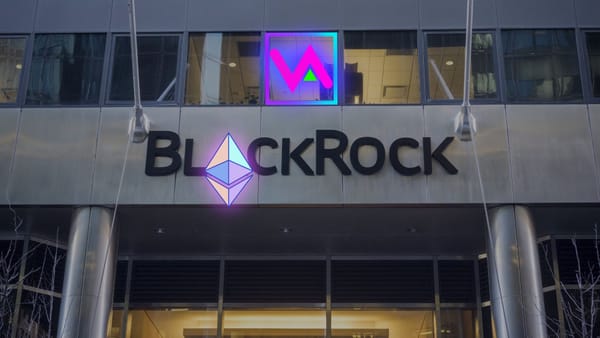
BlackRock Launches Tokenized Fund on Ethereum, Signaling Shift Towards Tokenization
BlackRock has launched its first tokenized fund called the BlackRock USD Institutional Digital Liquidity Fund ("BUIDL") on the Ethereum network this week. The fund is backed by $100 million in USDC stablecoin that was transferred to an Ethereum address linked to the fund.
-
BlackRock has launched its first tokenized fund called the BlackRock USD Institutional Digital Liquidity Fund ("BUIDL") on the Ethereum network this week, in partnership with asset tokenization firm Securitize.
-
The fund is backed by $100 million in USDC stablecoin that was transferred to an Ethereum address linked to the fund. It will provide institutional investors the opportunity to earn yields paid out daily via blockchain.
-
In January, BlackRock CEO Larry Fink said Bitcoin and Ethereum ETFs are "just stepping stones towards tokenization" which he believes is the future direction for financial markets. He sees value in launching an Ethereum ETF after BlackRock's successful Bitcoin ETF.
-
BlackRock filed for a spot Ethereum ETF with the SEC back in November. Some analysts estimate a 70% chance it could be approved as early as May, though an approval may face some regulatory hurdles.
-
The launch of BlackRock's Ethereum-based fund focused on tokenizing real-world assets (RWA) represents a major milestone in the growing tokenization trend. Many believe the tokenization market could grow to multi-trillion dollars by 2030.
-
BlackRock's moves are seen as the next stage in its digital asset strategy and could help drive mainstream adoption of Ethereum and tokenization. CEO Larry Fink believes tokenization can revolutionize financial markets by enabling instant settlement and eliminating corruption.
BlackRock Launches Tokenized Fund on Ethereum
BlackRock, the world's largest asset manager, has launched its first tokenized fund on the Ethereum blockchain. The BlackRock USD Institutional Digital Liquidity Fund, dubbed "BUIDL," was launched in partnership with asset tokenization firm Securitize and is backed by $100 million in USDC stablecoin.
The launch of the fund represents a major milestone in the growing trend of tokenization, which involves representing real-world assets as digital tokens on a blockchain. Many experts believe that the tokenization market could grow to become a multi-trillion dollar industry by 2030, and BlackRock's move is seen as a significant step towards mainstream adoption of this technology.
The BUIDL fund will provide institutional investors with the opportunity to earn yields paid out daily via the Ethereum blockchain. This is a significant departure from traditional investment funds, which typically pay out returns on a monthly or quarterly basis. By leveraging the power of blockchain technology, BlackRock is able to offer its clients a more efficient and transparent way to invest their money.
BlackRock's CEO, Larry Fink, has been a vocal advocate for the potential of tokenization in recent months. In January, he stated that Bitcoin and Ethereum ETFs are "just stepping stones towards tokenization," which he believes is the future direction for financial markets. Fink sees significant value in launching an Ethereum ETF, following the success of BlackRock's Bitcoin ETF.
In fact, BlackRock filed for a spot Ethereum ETF with the SEC back in November, and some analysts estimate a 70% chance that it could be approved as early as May. However, the approval process may face some regulatory hurdles, as the SEC has been hesitant to approve spot crypto ETFs in the past.
Despite these challenges, BlackRock's move into tokenization is seen as a significant step forward for the industry. By launching a fund that is focused on tokenizing real-world assets, BlackRock is demonstrating its commitment to this emerging technology and its potential to revolutionize financial markets.
The benefits of tokenization are numerous. By representing real-world assets as digital tokens on a blockchain, investors can gain access to a wider range of investment opportunities, while also benefiting from increased liquidity and transparency. Tokenization also has the potential to streamline the settlement process for financial transactions, reducing costs and increasing efficiency.
Fink believes that tokenization can help to eliminate corruption in financial markets by providing a transparent and immutable record of all transactions. This could be particularly valuable in emerging markets, where corruption and fraud are often major challenges for investors.
BlackRock's move into tokenization is also significant because of the firm's size and influence in the financial industry. With over $10 trillion in assets under management, BlackRock is one of the most powerful players in the global financial system. Its embrace of tokenization could help to drive mainstream adoption of this technology and pave the way for other major financial institutions to follow suit.
Of course, there are still many challenges that need to be addressed before tokenization can truly take off. Regulatory uncertainty remains a major obstacle, even though many jurisdictions have developed clear guidelines for the treatment of tokenized assets. There are also concerns about the security and scalability of blockchain networks, which will need to be addressed in order for tokenization to reach its full potential.
Despite these challenges, however, the launch of BlackRock's tokenized fund on Ethereum is a major milestone for the industry. It demonstrates the growing interest and investment in tokenization from major financial institutions and could help to accelerate the adoption of this technology in the years to come.
As more investors and institutions begin to recognize the potential of tokenization, we can expect to see a wave of innovation and experimentation in this space. From real estate and fine art to commodities and beyond, the possibilities for tokenization are virtually endless. And with the backing of major players like BlackRock, it seems likely that this trend will only continue to gain momentum in the years ahead.